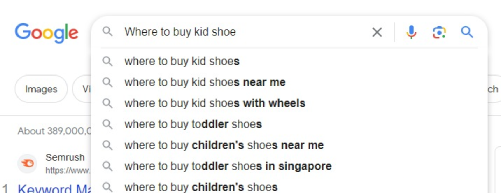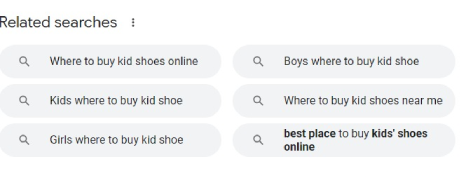In this article, we will be explaining how to do keyword research for SEO.
Let’s get started.

What is keyword research?
Keyword research is an important element of SEO (search engine optimization). It is the sum total of the effort put in to generate a rich list of keywords you want to rank your website for.
To come up with this list, you have to conduct research on your target audience and search engines.
For instance, you need answers to questions like “When searching for a specific service or product on Google, what kind of search terms do people use?” “What are their expectations?”
This list can assist in creating highly attractive and engaging content on your page, which implies improved traffic.

Why is Keyword Research Important?
If your keyword research is done properly, it can reveal precisely the search term your audience makes use of.
I have encountered business owners who use a certain word to define or refer to their products while their target audience utilizes an entirely different word set.
This will make it hard for potential customers to discover your website, implying that there is a discrepancy.
To prevent this discrepancy, you have to do in-depth keyword research. This will ensure that you make use of the words that interest your target audience.
Furthermore, you have to pay attention to your audience’s search intent. This will assist in identifying the needs and end goals of your audience. Then, you create quality content that satisfies your audience’s query.
How to do Keyword Research for SEO
In this section, I will explain the important steps to adhere to when conducting keyword research. I will give you a straightforward guide to simplify the entire research process.
Consider your Business Objectives and SEO goals
The first step is to consider your business objective. Ponder on questions like:
- What is the major objective of your brand or business?
- What helps your business stand out?
- Who is your target audience?
- What are the features or services listed on your website?
After giving in-depth answers to these questions, you have undertaken a vital step in crafting a keyword strategy.
For instance, you own an e-commerce website that sells children’s shoes. You provide great discounts, which makes your store attractive to parents.
If your unique selling point is the lowest price guaranteed or a special offer, It would make sense to keep this as your mission since your audience will get to enjoy it.
Create a List of Keywords you Believe People would Search for
The next step is drafting a list of keywords. Drawing from your business objectives, think like your target audience and ask yourself these questions:
- What would my target audience be searching for?
- What type of search terms would they make use of while searching for your business offers?
- Is your product or service a solution to any of their problems?
Draft a lot of answers if you can. Keep in mind your business objectives and your unique selling points.
For instance, for a children’s shoe store, the search terms you would want to rank for include:
- Children’s shoes
- Kids’ footwear
- Children’s shoe store
- Buy kids’ shoes
- Children’s shoe size
- Children’s shoe brands
- Where to buy kids’ shoes
- Kids’ shoe shop
- Children’s Shoe Guide
- Best children’s shoes
Do Research on the Keywords you’ve Listed.
Once you have listed the keywords, you have to research your keywords. Fortunately, there are good tools that can simplify your keyword research.
The most accessible tool out there is Google. Search for the keywords on Google and pay attention to the auto-complete. These are the search terms the algorithm predicts people will ask Google! It is quite reliable.

Also, check out related searches on Google’s results pages.

Another interesting tool to find related keyphrases is Answer the Public.
These tools offer variants of your keywords or phrases in the form of questions and synonyms.
Review them accordingly, and include the relevant keyphrases in the list you have.
Make Research Findings on your Keyword’s Long-tail Variants
When researching keywords, people begin by concentrating on “head” terms. Sadly, big businesses would have ranked for these head keywords. Long-tail keywords have low search volume.
However, they aren’t very competitive. So, you will find it less difficult to rank for that kind of keyword.
An example
If [children’s shoes] is your head term, a long-tail keyword might be “Buy kids’ shoes online”, “Kids’ shoe store near me”, “Cheap Children’s shoe brands in New York and How to measure kids’ shoe sizes
You can use keyword research tools to identify long-tail variants of your keyword with low search volume and difficulty.
Conduct Competitor Analysis for your Keywords
Your level of competition will help you determine if you should focus on long-tail keywords. If your niche is highly competitive, you will find it difficult to rank for head terms.
But with low competition, you can rank properly for head terms on search results.
You have to evaluate your competitors and monitor trends in your industry.
Search for keywords from the list you already have. Begin with the primary “head” term.
Review the search engine results page (SERP). You will find websites that are your competition after content optimization for a specific keyword. Do a critical evaluation.
- Are the websites professional in nature?
- Do they belong to a company?
- Can you match these companies?
- Is your website relevant to this niche?
It is more difficult to rank when you are up against popular and reputable brand names, such as Wired, Samsung, Walmart, and Nike.
However, if you have properly optimized, quality content and your competitor has a low-quality one, there is a likelihood of outranking them.
Analyze the Search Intent for a Specific Keyword
The best SEO tactics focus on giving answers to the most searched-for questions or offering a highly effective solution to problems.
Anyone who inputs a search term into a search box is looking for something. You have to provide a specific answer to this.
Find Out about Search Intent
Identify the intent of your target audience as they search for keyphrases on Google:
- Are they interested in learning about a certain topic? (informational intent)
- Are they looking for a specific page or website? (navigational intent)
- Are they doing research before making a purchase? (commercial intent)
- Do they wish to take action or make a purchase? (transactional intent)
You can find out the search intent of a specific query by doing an analysis of the kind of page that ranks for it.
For instance, are there more product pages? Or plenty of blog articles with information? Are there any videos? This will give you a clue as to what Google believes the search intent is.
Decide on a Keyword Strategy
Using the data you have gathered, the next step is to set up a keyword strategy. With the details in this article, you likely have a list of key phrases and data about your competition and the target audience’s search intent.
Next, assess these questions: Does your website match up with other sites listed on the search engine results pages, particularly in terms of size and marketing budget?
Then, pay attention to those head terms. You can also focus on long-tail keywords. They have the potential to drive plenty of traffic. After already ranking for long-tail keywords, it is simpler to perform well for head terms on SERP.
Check the Effectiveness of your Keyword Strategy and Make Improvements
After doing a careful assessment of your likelihood of ranking for certain search terms, ensure you create and optimize some excellent articles.
Then, exercise a bit of patience. Review the page performance in SERPs. Where does your page appear? Is it on page 1 of the search results page? Is it tucked away somewhere on page 3? Ensure you assess your results on the search results pages.
There are plenty of ways to assess your content performance in SERPs. The easiest way is to search the keyword on Google and see the position of your optimized page.
Another method is to utilize Google Search Console to check the queries your page ranks for.
Alternatively, you can use any keyword tool to track your ranking and find new opportunities.
FAQ
What are the most important factors for choosing keywords for SEO?
The three most important things to consider for keywords are relevance, volume, and authority.
What are the steps in undertaking keyword research?
- Create a list of topics that have relevance to your keywords.
- Broaden each topic with phrases you believe customers might use.
- Identify “related searches.”
- Assess the effectiveness of your keywords.
- Check your rank in your niche or location.
- Review the search intent of your target audience.
How do I tell if my SEO is working?
Here are ways to know if your SEO strategy is working:
- Better website health score.
- Improved organic traffic.
- Better or higher page rank.
- Lower bounce rates, which implies visitors are investing time in your pages.
- Better conversion rates
- Growth in the number of referring domains.
Conclusion
Keyword research is vital to any SEO strategy. It helps your website rank for relevant keywords and attract qualified traffic.
This article explains how to do keyword research for SEO.
 PrimeGate Digital is a Result Driven Blog that strives to go beyond ‘Conventional Digital Marketing’ through digital innovation and performance marketing. We have experience working with world class brands and products.
PrimeGate Digital is a Result Driven Blog that strives to go beyond ‘Conventional Digital Marketing’ through digital innovation and performance marketing. We have experience working with world class brands and products.
